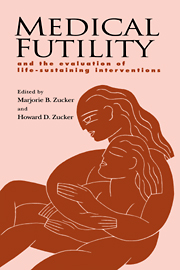Book contents
- Frontmatter
- Contents
- Preface
- Foreword
- Contributors
- 1 Medical futility: a useful concept?
- 2 Death with dignity?
- 3 Physicians and medical futility: experience in the critical care setting
- 4 Physicians and medical futility: experience in the setting of general medical care
- 5 Futility issues in pediatrics
- 6 Medical futility: a nursing home perspective
- 7 Alternative medicine and medical futility
- 8 How culture and religion affect attitudes toward medical futility
- 9 When religious beliefs and medical judgments conflict: civic polity and the social good
- 10 Conflict resolution: experience of consultation-liaison psychiatrists
- 11 Ethics committees and end-of-life decision making
- 12 The economics of futile interventions
- 13 Medical futility: a legal perspective
- 14 Professional and public community projects for developing medical futility guidelines
- 15 Community futility policies: the illusion of consensus?
- 16 Not quite the last word: scenarios and solutions
- Index of cited authors, cases, and statutes
- Subject index
4 - Physicians and medical futility: experience in the setting of general medical care
Published online by Cambridge University Press: 11 September 2009
- Frontmatter
- Contents
- Preface
- Foreword
- Contributors
- 1 Medical futility: a useful concept?
- 2 Death with dignity?
- 3 Physicians and medical futility: experience in the critical care setting
- 4 Physicians and medical futility: experience in the setting of general medical care
- 5 Futility issues in pediatrics
- 6 Medical futility: a nursing home perspective
- 7 Alternative medicine and medical futility
- 8 How culture and religion affect attitudes toward medical futility
- 9 When religious beliefs and medical judgments conflict: civic polity and the social good
- 10 Conflict resolution: experience of consultation-liaison psychiatrists
- 11 Ethics committees and end-of-life decision making
- 12 The economics of futile interventions
- 13 Medical futility: a legal perspective
- 14 Professional and public community projects for developing medical futility guidelines
- 15 Community futility policies: the illusion of consensus?
- 16 Not quite the last word: scenarios and solutions
- Index of cited authors, cases, and statutes
- Subject index
Summary
Futility – the doctor's dilemma
Patient autonomy, the dominating ethical principle that controls clinical decision making, evolved as a right of patients to be protected from inappropriate and unwanted application of life-extending medical technology. This principle reflects an ethical and legal consensus that serves to define the rights of patients and to set a standard against which physician and institutional actions can be judged.
Unfortunately, no comparable ethical consensus or body of law exists when the issue is not the right of patients to refuse treatment but instead is the limit to their rights to receive treatments. This issue appears when treatments under consideration have little chance to succeed or, on balance, provide little or no advantage to patients compared with the burdens that accompany their implementation. The term medical “futility” has come to encompass this group of problematic treatments.
In the clinical setting, the issue of futility can generally be described as follows: When is the value of a treatment or procedure sufficiently small or uncertain that it can be considered to be futile and, accordingly, the right of patients to choose it should be limited? Who decides that a medical treatment is futile, and what would be an equitable mechanism to establish and put into effect such determinations?
- Type
- Chapter
- Information
- Medical FutilityAnd the Evaluation of Life-Sustaining Interventions, pp. 36 - 47Publisher: Cambridge University PressPrint publication year: 1997
- 1
- Cited by

